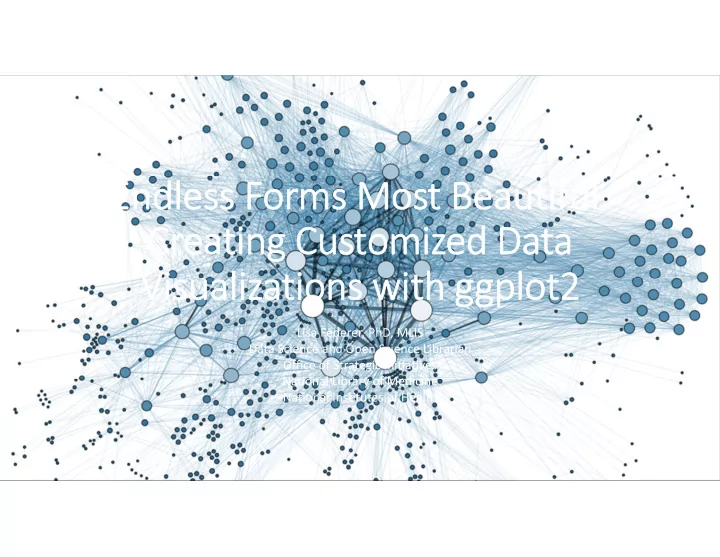

Endless Forms Most Beautiful: Creating Customized Data Visualizations with ggplot2 Lisa Federer, PhD, MLIS Data Science and Open Science Librarian Office of Strategic Initiatives National Library of Medicine National Institutes of Health
The Grammar of Graphics: components of visualizations Practical considerations and design choices Workshop overview Creating plots in RStudio with ggplot2 Your questions
The Grammar of Graphics “A language consisting of words and no grammar expresses only as many ideas as there are words. By specifying how words are combined in statements, a grammar expands a language’s scope…The grammar of graphics takes us beyond a limited set of charts (words) to an almost unlimited world of graphical forms (statements).”
• Data : what is being visualized. • Mappings : mappings between variables in the data and components of the chart. • Geometric Objects : geometric objects that are used to Grammar of display the data, such as points, lines, or shapes. Graphics • Aesthetic Properties : qualities about geometric objects that convey details about the data “parts of • Scales: control how variables are mapped to aesthetics. • Coordinates: describe how data is mapped to the plot speech” • Statistical Transformations : applied to the data to summarize it. • Facets: describe how the data is partitioned into subsets and how these different subsets are plotted.
facets geometric mappings objects scales coordinates aesthetics data
From code to chart diamonds %>% ggplot(aes(x = price, y = carat, col = color, size = clarity)) + geom_point(stat = "unique") + coord_cartesian(xlim = c(0,20000)) + xlab("Price, US $") + ylab("Carat") + ggtitle("Prices and Characteristics of Round Cut Diamonds") + facet_wrap(~cut, nrow=1) + scale_colour_brewer(palette = "YlOrRd")
From code to chart: data diamonds %>% ggplot(aes(x = price, y = carat, col = color, size = clarity)) + geom_point(stat = "unique") + coord_cartesian(xlim = c(0,20000)) + xlab("Price, US $") + ylab("Carat") + ggtitle("Prices and Characteristics of Round Cut Diamonds") + facet_wrap(~cut, nrow=1) + scale_colour_brewer(palette = "YlOrRd")
From code to chart: mappings diamonds %>% ggplot(aes(x = price, y = carat, col = color)) + geom_point(stat = "unique") + coord_cartesian(xlim = c(0,20000)) + xlab("Price, US $") + ylab("Carat") + ggtitle("Prices and Characteristics of Round Cut Diamonds") + facet_wrap(~cut, nrow=1) + scale_colour_brewer(palette = "YlOrRd")
From code to chart: geometric objects diamonds %>% ggplot(aes(x = price, y = carat, col = color, size = clarity)) + geom_point(stat = "unique") + coord_cartesian(xlim = c(0,20000)) + xlab("Price, US $") + ylab("Carat") + ggtitle("Prices and Characteristics of Round Cut Diamonds") + facet_wrap(~cut, nrow=1) + scale_colour_brewer(palette = "YlOrRd")
From code to chart: aesthetic properties diamonds %>% ggplot(aes(x = price, y = carat, col = color, size = clarity)) + geom_point(stat = "unique") + coord_cartesian(xlim = c(0,20000)) + xlab("Price, US $") + ylab("Carat") + ggtitle("Prices and Characteristics of Round Cut Diamonds") + facet_wrap(~cut, nrow=1) + scale_colour_brewer(palette = "YlOrRd")
From code to chart: scales diamonds %>% ggplot(aes(x = price, y = carat, col = color, size = clarity)) + geom_point(stat = "unique") + coord_cartesian(xlim = c(0,20000)) + xlab("Price, US $") + ylab("Carat") + ggtitle("Prices and Characteristics of Round Cut Diamonds") + facet_wrap(~cut, nrow=1) + scale_colour_brewer(palette = "YlOrRd")
From code to chart: coordinates diamonds %>% ggplot(aes(x = price, y = carat, col = color, size = clarity)) + geom_point(stat = "unique") + coord_cartesian(xlim = c(0,20000)) + xlab("Price, US $") + ylab("Carat") + ggtitle("Prices and Characteristics of Round Cut Diamonds") + facet_wrap(~cut, nrow=1) + scale_colour_brewer(palette = "YlOrRd")
From code to chart: facets diamonds %>% ggplot(aes(x = price, y = carat, col = color, size = clarity)) + geom_point(stat = "unique") + coord_cartesian(xlim = c(0,20000)) + xlab("Price, US $") + ylab("Carat") + ggtitle("Prices and Characteristics of Round Cut Diamonds") + facet_wrap(~cut, nrow=1) + scale_colour_brewer(palette = "YlOrRd")
Practical considerations and design choices Working effectively with color and chart choices
Pre‐attentive processing Differences in shape Differences in hue
Perceptual tasks From Alberto Cairo, The Functional Art Adaptation of Cleveland and McGill’s scale from “Graphical Perception: Theory, Experimentation and Application to the Development of Graphical Methods,” available at https://web.cs.dal.ca/~sbrooks/csci4166‐6406/seminars/readings/Cleveland_GraphicalPerception_Science85.pdf
Design for ease of perceptual processing
Colorspaces (ggplot default = RGB)
Greyscale (“photocopy safe”)
Greyscale – nope!
Color blindness
http://www. vischeck.com/ vischeck
Named colors in R http://www.stat.columbia.edu/~tzheng/files/Rcolor.pdf
Color Brewer palettes
Recommend
More recommend